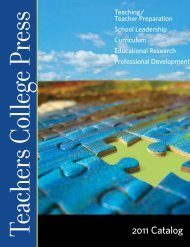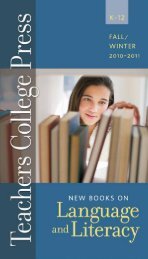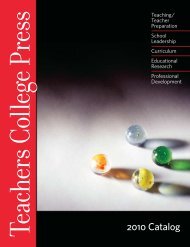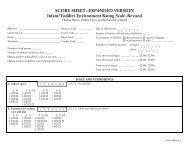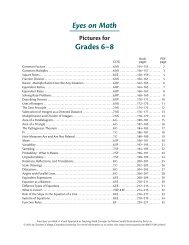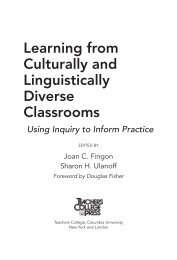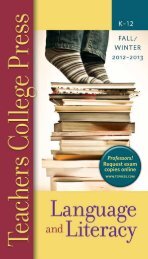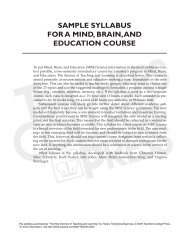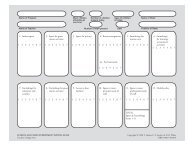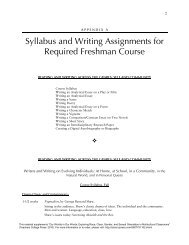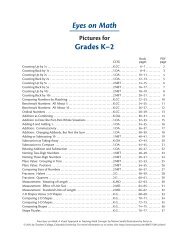Spectacular Things Happen Along the Way - Teachers College Press
Spectacular Things Happen Along the Way - Teachers College Press
Spectacular Things Happen Along the Way - Teachers College Press
You also want an ePaper? Increase the reach of your titles
YUMPU automatically turns print PDFs into web optimized ePapers that Google loves.
questions: Which issues were at <strong>the</strong> center of <strong>the</strong> curriculum and which were at<br />
<strong>the</strong> periphery? Which issues contributed to each o<strong>the</strong>r?<br />
3. Compare this social action project with o<strong>the</strong>r efforts to teach about and for social<br />
justice reviewed in educational scholarship. For example, some justice-oriented<br />
projects are based around <strong>the</strong> needs of o<strong>the</strong>rs (i.e., students learn about and take<br />
action around people’s life experiences unlike <strong>the</strong>ir own). O<strong>the</strong>r projects, such as<br />
<strong>the</strong> one in Room 405, ask students to address issues in <strong>the</strong>ir own lives. Walter<br />
Parker’s Teaching Democracy (2003) and Rahima Wade’s Social studies for<br />
social justice (2007), might be helpful here as <strong>the</strong>se texts describe teachers and<br />
students working towards democracy and social justice in K–12 schools. After<br />
you have identified a series of comparisons, discuss <strong>the</strong>ir implications. What are<br />
<strong>the</strong> possibilities and limitations of different projects?<br />
4. Discuss <strong>the</strong> role of race and class in <strong>the</strong> book. Some questions to guide your<br />
conversation may include: How might <strong>the</strong> project have evolved if Schultz asked a<br />
class of white students to evaluate <strong>the</strong> problems in <strong>the</strong>ir community? More<br />
broadly, how does race, class, gender, sexual orientation, or learning ability affect<br />
students as <strong>the</strong>y enact social action projects? Jaris (a student in Room 405)<br />
thought that <strong>the</strong> students’ not getting a new school had something to do with<br />
“blackness” (p. 38). Consider using this insight to prompt discussion.<br />
5. Read a book on urban poverty or urban schooling as a co-text so to create a<br />
sociohistorical backdrop for <strong>Spectacular</strong> <strong>Things</strong> <strong>Happen</strong> <strong>Along</strong> <strong>the</strong> <strong>Way</strong>. You<br />
may consider Jonathan Kozol’s Savage Inequalities (1991), as this is what <strong>the</strong><br />
students in Room 405 read when building an understanding of <strong>the</strong>ir own<br />
experience. Also, Pauline Lipman’s High stakes education (2007) analyzes<br />
several schools in Chicago, and <strong>the</strong>refore offers a place-specific framing of <strong>the</strong><br />
story of Schultz and <strong>the</strong> fifth graders. Write about or discuss <strong>the</strong> role of social<br />
action projects given <strong>the</strong> realities presented in <strong>the</strong>se texts.<br />
6. Discuss <strong>the</strong> work of <strong>the</strong> fifth graders in light of an analytic framework that<br />
illustrates <strong>the</strong> possibilities of civic education. For example, Wes<strong>the</strong>imer and<br />
Kahne’s What Kind of Citizen? The Politics of Educating for Democracy (2004)<br />
outlines different kinds of citizens:<br />
i. a “personally responsible citizen acts responsibly in his or her<br />
community” by engaging in service work such as recycling<br />
ii. a “participatory citizen” engages in collaborative community<br />
efforts and could be seen organizing food drives<br />
iii. a “justice-oriented citizen” works collaboratively and also<br />
critically analyzes and questions <strong>the</strong> reasons why injustices persist<br />
(p. 241).<br />
7. Given this framework, what forms of citizenship were taught in Room 405 and<br />
how was this done? How could <strong>the</strong> project have been revised so that it would<br />
have forwarded a different form of citizenship? Would such changes have made<br />
<strong>the</strong> project more or less transformative?<br />
8. Debate <strong>the</strong> value of different aspects of <strong>the</strong> project in Room 405. For example:<br />
This Guide accompanies “<strong>Spectacular</strong> <strong>Things</strong> <strong>Happen</strong> <strong>Along</strong> <strong>the</strong> <strong>Way</strong>” (<strong>Teachers</strong> <strong>College</strong> <strong>Press</strong>: 2008).<br />
For more information or to order, please visit: http://store.tcpress.com/0807748579.shtml



